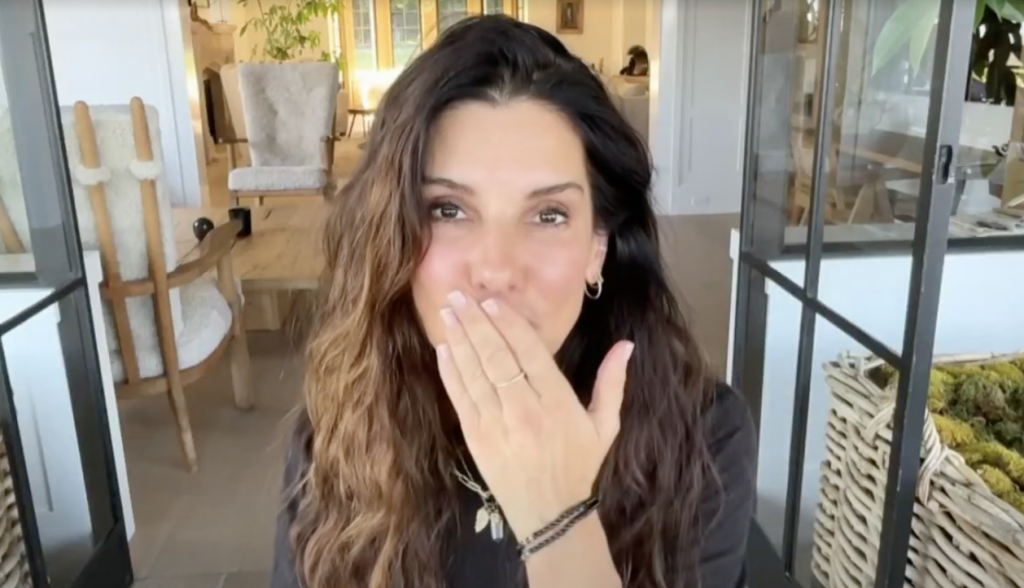Fabulous at 60
- Sandra Bullock wants people to know that turning 60 feels “pretty damn great.” The Gravity star, in a birthday message to beloved TODAY host Hoda Kotb, who turned 60 last week, said that women should not be “afraid” to embrace the milestone.
- The message is particularly powerful as Bullock has suffered a recent loss: she lost her longtime partner Bryan Randall last August to ALS, a rare neurological disorder. Bullock has understandably been taking some time to grieve, and now with this very public message, shows it is possible to continue to live your life after loss.
- Grief is complex — there are many stages. And it often never goes away. But know that you can still find happiness and live a full live, honoring your loved one in every moment. Make sure to reach out to a mental health professional if you are struggling with feelings of loss. It can get better.
The message is particularly powerful as Bullock has recently suffered a tragic loss, losing her longtime partner Bryan Randall last August to ALS, a rare neurological disorder. Not only does her appearance show that women can age gracefully, and with confidence and dignity, but that it is possible to pick up the pieces and live your life after loss.
Read More
“Happy birthday, sweet friend,” Bullock said in her endearing message, with a bit of emotion coming through while speaking of her dear pal and all she does to “shapeshift” every single day on the job. “Thank you for being so incredible to so many people.”
Bullock also noted how Kotb “navigates kindness, even when it’s not coming your way” and how she is in general “to those you care about and how you keep them safe — and just how you are as a human being.”
“Thank you for allowing me to be in your circle, I feel very grateful.”
A teary-eyed Kotb then explained to the live audience how Bullock was one of the women who inspired her when she considered adoption. Hoda, a breast cancer survivor who was unable to conceive due to treatment, had called her up to ask about having kids at their age, as Bullock first became a mother in her late 40s via adoption, and now Kotb has two little girls, Haley Joy and Hope Catherine, who she adopted in 2017 and 2019.
Bullock is the mom of son Louis, 14, and Laila, 11, and an older daughter Skyler, 30, from her late love’s previous marriage.
Surviving the Loss of a Partner
Losing someone you love is one of the deepest forms of pain that a human can experience. In some cases, a spouse with cancer or another potentially fatal disease can take proactive steps to talk about what might come after.
John Duberstein, who lost his wife, writer Nina Riggs, to metastatic triple negative breast cancer told SurvivorNet that while he was watching her suffer from the disease, he couldn’t help but wish things could go back to normal — but Riggs had already embraced her new normal.
RELATED: The Toughest Conversations: Losing a Spouse to Cancer
“I really wanted things to go back to normal, whatever that meant,” Duberstein said. “She was not for that. She wanted to embrace the existence that she had, even before she knew she was going to die imminently. I did not want to talk about what was going to happen with me after Nina died. Nina is the one that really brought it up, she brought it up a number of times.”
‘Therapy saved my life’: After losing a loved one, don’t be afraid to ask for help
Duberstein explained that even with the pain of losing his wife, and even though he didn’t want to talk about it at the time, he’s so glad they had those seemingly uncomfortable conversations. “In retrospect, I can’t even explain how glad I am that I had that.”
This is a reminder that having those uncomfortable and painful conversations with your partner can be fundamental to your well-being as you move forward in the grieving process, alleviating the guilt felt in starting to date again, and/or eventually marry.
Finding Joy Every Day
To distract your mind and keep negative feelings out during challenging times, oncologist Dr. Dana Chase recommends jotting down ten things that make you happy and making the time to do those activities throughout the day. In Amanda Kloots’ case, dancing has been a major help in helping her feel better and cope with the grief she’s been dealing with.
“Sometimes I will talk to a patient about making [a] list of the top ten things that bring them joy. And trying to do those ten things to make at least 50 percent of their experiences positive throughout the day,” Dr. Chase previously told SurvivorNet.
Dr. Dana Chase explains why mindset is so important when facing difficult times
Even if you’re working hard to prioritize your mental health by doing activities you love, it can still be quite overwhelming to think of things you can’t control after losing a loved one.
Dr. William Breitbart, chair of the department of psychology and behavioral sciences at Memorial Sloan Kettering Cancer Center, says acceptance is an important part of living.
“What the task becomes is having the courage to live in the face of uncertainty, realizing that you cannot necessarily control the uncertainty in life, the suffering that occurs, limitations, challenges both good and bad,” Dr. Breitbart said.
Learn more about SurvivorNet's rigorous medical review process.

